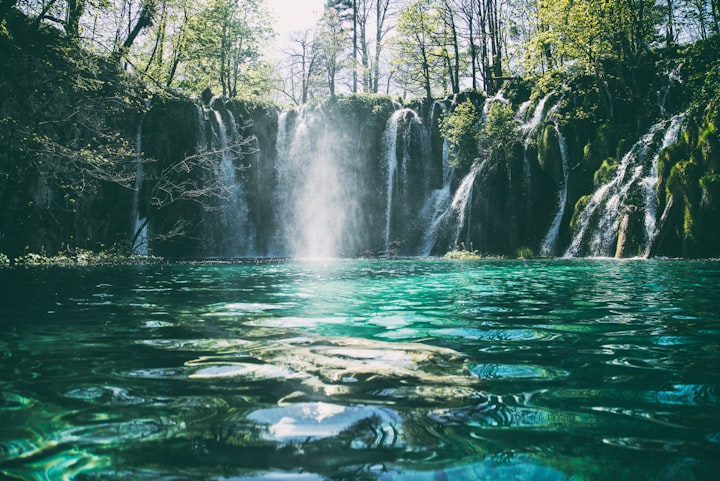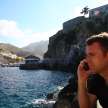How to Find a Home in Exile
A kingdom waits where no roads go

Who lives in these houses?
Tall windows throw off light like vacant eyes, absorbing nothing, reflecting everything. Floating docks rise and fall, gentle as sleeping breath. Boats sway in the green water.
It’s the only way to get out here where no roads go. For most of history, travel was easiest by water. Every great city sits along a river, if not the sea. It’s only a hundred years since we started carving black scars of roads through the forest. Look where it’s gotten us.
You want this. At least, you’re supposed to want this. A fragment of beauty you can snatch out of the world, leaving its dust on your fingertips.
Plant a flag on a scrap of land. Measure it and name it. Dig a well and bury a septic tank and pay to have a boat come by every few years and pump out your foul-smelling waste.
I used to want this. To plant my own flag in a place no one could make me leave. A kingdom of my own. Or at least a Socialist republic. I’ve lived in so many places around the world, but I’ve never once felt at home.
But exile becomes its own kind of kingdom. After a while, constant movement becomes home. The houses on the lake are beautiful. Listen to those rusted chains clink quietly as breakwaters made of slippery logs shift and settle. But I don’t want this anymore. I’d rather keep moving.
Once you’re halfway there, you have to make a choice
You can go on. Or you can go back.
The lake was an emerald mirror. The sun glowed under the surface. Digging my paddle into the water, I pressed on, pulling the lake and the world behind me while I stayed static, floating above it all.
You hear it before you see it. The constant rushing hiss that sounds at first like wind where no wind is blowing.
Most of the lake’s eastern shore is stark rock. Sheer faces of granite plunge straight into the water from the forest above, reaching a thousand feet down to the lake’s lightless bottom. Where there’s a beach, there’s a house. And a boat. And a guard dog or two.
But there’s one dock that belongs to the Province. And the water gets suddenly shallow as a semicircular bulge of gravel lunges into the lake. Ancient stones shattered and split and rolled down from the mountains by centuries of rain. This is where the waterfall is.
I landed.
The water cooled my feet as I stepped into it. The beach was deserted except for me. My own isolated kingdom, for as long as I was there.
A musty old outhouse bloomed with a spray of mosquitoes as I kicked open the rotten door. The roar of the water filled the forest, calling me on. Moving water chatters and laughs, and if you sit long enough beside it, it starts to speak to you. My Irish ancestors knew all about water spirits, the inhuman life of sound and stone. They never saw this waterfall. But if they had, they would have recognized it at once.
The river was no warmer than the lake it feeds. The white river plunges from a 30-foot cliff into a tangle of broken rock. This late in the year, the stream isn’t what it was. Ice is starting to grip the lakes and rivers on top of the mountains, slowing rushing torrents down to a trickle. Before long, winter will reach the bottom of the valley, and the rivers will stop running at all.
But for now, thin streams race each other down from above, splitting and rejoining like the lines on your palm that whisper the future. The bright sky plunges into a gap in the trees the river makes, sun and water eager to meet each other, to dance to the music of transformation the whole world sings.
Carefully, I picked my way over the rocks. Stone shifted and cracked underfoot. My wet prints showed my stumbling steps through shadow and sun. We want to get closer to beautiful things, as though touching them will make us part of them.
I once saw a waterfall that could turn anything it touched to stone. But that wasn’t here. Instead, this waterfall looks like it could turn everything into light.
Ice cold water beat against the fingers of my outstretched hand. Up close, the noise of the falls filled the world, drowning out the singing birds and the lapping lake and the deep hum of a floatplane coming in to land behind me. A world this bright can drown out anything else. Every tumbling drop becomes a mirror in which every other drop is reflected, the dazzling jewels of Indra’s net hurrying toward the beach to be reborn.
I drew my hand away. It’s in the nature of humans to reach out for pretty things, to try to hold them and keep them and guard them for ourselves. But it’s in the nature of water to slip through our fingers. The rivers stop singing when you lock them up behind dams and concrete walls. If there is any magic in a stream like this, it’s because it is always running away from us.
Back at the dock, I was no longer alone.
A family of tourists had arrived in a motorboat with complicated patterns of sunlight shining on its silver hull, reflected from the water below. We said hello to one another. We smiled. But as they made their way noisily into the forest, whooping along the trail I had just used, my solitary kingdom crumbled into dust behind me.
I like to be alone.
The river talks to me more clearly when there’s no one else around to interrupt it. I can only really take you to the places that I visit by myself. When other people show up, it’s time for me to leave.
But I don’t own the waterfall or the river or the lake. I don’t have more right to it than anyone else. My quiet kingdom can’t withstand invasion, but that’s my problem, not theirs.
And as I paddled back past the fancy houses and bobbing boats that line the lake, I thought about the futility of trying to own anything. Of trying to stake out a patch of sunlight for yourself and cling onto it in a world that knows only change. Nothing is more certain than that everything you have will be taken away.
You know what they say about the water you drink and the food you eat. You don’t buy it. You’re only renting it. But the world is like this, a vast and constantly moving pattern that flows through us like sand through the pinch point of an hourglass.
I’ve owned a car and a home and a business. I don’t own any of them anymore. And really, I never did. You borrow everything from Fate if it’s kind enough to offer you something, knowing it all has to go back the way the river returns to the lake and the lake to the sea.
But if I ever make the long journey back to this waterfall or to any other, my kingdom will be waiting for me there.
About the Creator
Ryan Frawley
Towers, Temples, Palaces: Essays From Europe out now!
Novelist, entomologist and cat owner. Ryan Frawley is the author of many articles and stories and one novel, Scar, available from online bookstores everywhere.






Comments
There are no comments for this story
Be the first to respond and start the conversation.